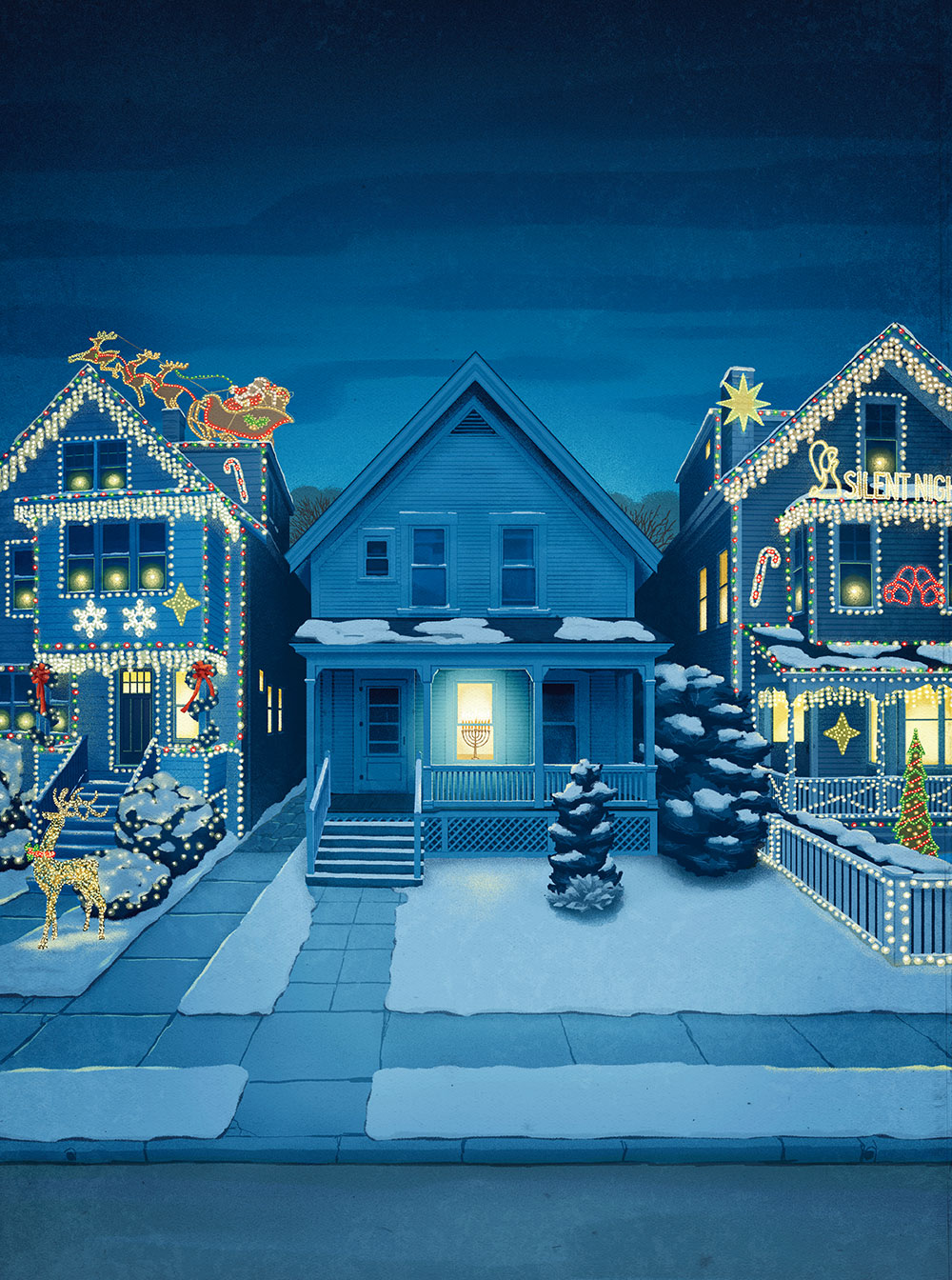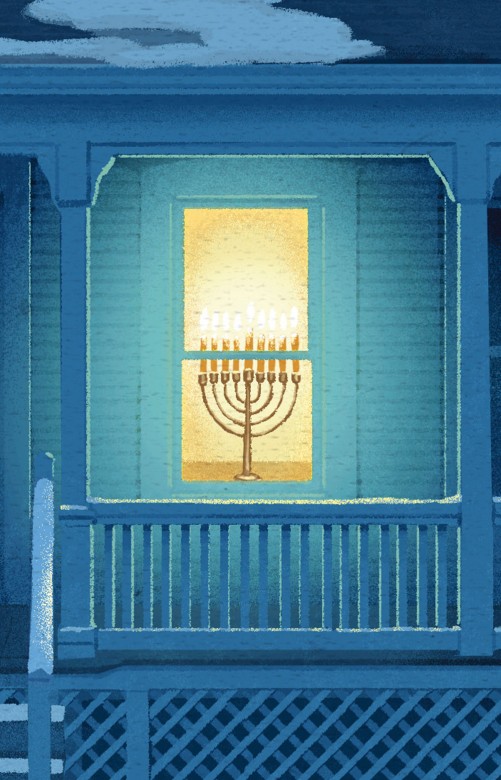A Blue-and-White Christmas
What if your faith doesn’t include Christmas as a celebration? Naomi Shulman ponders a blue-and-white Christmas in this touching essay.

A Blue-and-White Christmas
Photo Credit : Tim Tomkinson
Photo Credit : Tim Tomkinson
We didn’t have a Christmas tree at home. My family was Jewish, one of a handful living in Vermont’s Northeast Kingdom in the 1970s, and from the day after Thanksgiving till January 2, I was reminded of that fact everywhere I looked—because everywhere I looked was Christmas, and Christmas was emphatically not for me.
A few short years before, it was another Christmas concert that had first alerted me that I was an outsider. We kindergarteners were each given a small prop to hold—a candy cane, sleigh bells, a sprig of holly—and a few short lines to recite about them. “Here,” my teacher said, thrusting a menorah into my lap. “You will talk about this.”
Oh. I loved Hanukkah, of course—it was my favorite holiday. Eight days of presents, crispy fried latkes, playing dreidel for chocolate gelt—what wasn’t to like? But it did seem ironic to call Hanukkah the Festival of Lights when ours was the one undecorated house on the street. Leaning my head against the frosted window in the backseat of our car, I loved looking at my neighborhood—from the quiet understated beauty of the clapboard houses, with a single candle in every multipaned window and an unadorned wreath on the front door, all the way up to the giant inflatable Frosty undulating next to the animatronic Santa singing Irving Berlin songs in his neon-lit sleigh. “Irving Berlin was Jewish, you know,” my dad might comment. “Then why can’t we have a tree?” I’d reply as we pulled into our own dark driveway. One year my mother hung a poster of the Tree of Life in Jerusalem. “Here’s your tree!” she sang out. It didn’t cut it. No tree. No stockings. No Irving Berlin, even. I watched it all unfold through the frosted car window, through glass.
There was one place where I participated, though. In Lyndonville, Vermont, in the 1970s, teachers played fast and loose with separation of church and state, so I—along with every other child in my public-school class—received hymn books that included just about every Christmas carol you can think of. I loved to sing, and I loved these songs—the vigor of “Joy to the World,” the pathos of “Little Drummer Boy,” the quiet reverence of “Silent Night.” It wasn’t until I found myself inadvertently humming “We Three Kings” one Sunday afternoon that my Hebrew-school teacher—an Israeli ex-pat with huge hair and a penchant for blue eyeshadow—raised an eyebrow. “Why are you singing that?” she said. “You can’t sing that. When they sing those songs at school, you stay quiet.”
And since my need to please outweighed my love of song, I did stay quiet. I stood with my mouth shut, staring into the middle distance, until the music teacher—a New York City–born back-to-the-lander—finally stopped the class and called me out. “Naomi, I’m missing your lovely voice,” she said.
“I can’t sing these songs, Mrs. Fried,” I explained. “I’m Jewish.” Thirty children’s heads craned on 30 small necks to look at me.
“So am I, hon,” she said.
Of course. I’d seen her at our synagogue—two rented rooms, actually, above a pharmacy in St. Johnsbury. People hailing from Montreal, New York, and Philly filled the seats each fall for the High Holidays; together we represented the tiniest of tiny groups in an already-tiny place. If you didn’t know where the shul was, you’d never guess it; an unmarked door took you up a dark, narrow staircase to an open, creaky-floored, large-windowed space. Children fidgeted through Shabbat services, looking forward to the promise of challah and grape juice at the end; mothers kibbitzed in the kitchen as they prepped oneg shabbats and Yom Kippur break-fasts. Sanka percolated endlessly in a big silver carafe.

Photo Credit : Tim Tomkinson
Eavesdropping on adults, I noted that the older the participants, the more Yiddish was sprinkled into the conversation. In our little Sunday school we used our Hebrew names—Chaim, Leah, Mordecai—and stumbled our way through the alefbet in dim winter light. The windows downstairs were lined with twinkling lights and gold tinsel ropes, but up here the lights in the windows were menorahs, placed on the sills to fulfill the mitzvah of pirsuma d’nisa, or “publicizing the miracle.” How many people noticed their quiet flickers, dwarfed by the blinking red-and-green explosion all around them? Oh well. That was what we had.
Well, it wasn’t all we had. A community so tiny has to have chutzpah to survive. Our congregation—which included my pediatrician, my orthodontist, multiple lawyers, several professors, and yes, my music teacher—might have been a dot of blue in a landscape painted red-and-green, but it was a vivid blue. It was the only Jewish game in town, so just about every Jew within a 50-mile radius played. Conservative, Orthodox, Reform—all were welcome. Crazy-haired, Birkenstocked hippies commingled with housedress-clad bubbies and beeper-wearing physicians. The furrier’s wife with the bleached-blonde hair smoked lipstick-stained Virginia Slims as she chatted with the organic gardener, the one who stocked shelves at the natural-foods co-op. Here, no matter where we fit in our other lives, we were all of a kind. For a little while, anyway. When we walked back down that narrow staircase, back into the small downtown, Main Street was draped with red lights leading toward the apex of a golden crown. For lo, a king is born, but not our king. Not our holiday.
I came up with a strategy for music class. I started singing again, but I’d slide softly over lines like “Jesus is king.” No one would notice. When our class art project was making ornaments for our Christmas trees, I said nothing, gamely attaching bits of felt to a length of gold string. My classmates’ ornaments would hang on their trees. Mine was destined to hang on the fridge with all my other artwork.
I wasn’t passing, exactly, but I wasn’t sticking out, either. I was invited to enjoy the sights and smells and sounds along with everyone else, but it was like looking through the storefront at the toys inside, knowing none of them were for me. Through glass.
—
Years later, the fact that I was Jewish and that Chris, the man I eventually married, wasn’t came up on our very first date. We held this fact up to the light, examined it for a few moments, then put it aside, deciding blithely that it wasn’t a problem. Another Vermonter with liberal political leanings and two educators for parents? It didn’t feel like a stretch. Our marriage is technically mixed, as Chris hasn’t converted, but our home functions with only one religious tradition: mine. Our daughters are Jewish by law and by practice. Still, our girls don’t experience Christmas through the glass window as I did, because as soon as they were born, we began spending every Christmas at Chris’s parents’ house.
Here, finally, is the Christmas celebration I’ve always longed for. We drive up to Burlington through the snow to find a huge red-ribboned wreath on the front door and tasteful white lights in a curlicue around the windowboxes. Inside is a riot of poinsettias and Advent calendars and small china crèches; the log in the fireplace crackles, with stockings hung just above. And yes—of course!—a floor-to-ceiling tree, resplendent each year with hundreds of glittering ornaments, some of them made by my own children, just as though the holiday were meant for them.
“Aren’t you lucky?” I say to them each year. “We celebrate our holidays here at home, and then we get to share Grandma and Grandpa’s holiday with them.” Christmas is theirs, I’m saying, not yours. That was my experience, and it would be theirs, too, I’d assumed. But for the girls, Christmas is a magic show, one for which they have a ticket. Years ago, when I looked up at that Christmas tree on the stage, I knew it was just a performance, just make-believe. Snuggled in sleeping bags, my children look up at their grandparents’ tree and know that they’ll wake up to bulging Christmas stockings embroidered with their names. They feel left out of nothing. They’ve gained entry into that world in a way that I couldn’t.
But then, I did.
—
Five years ago in early November, my mother-in-law, Eadie, fell down the stairs. At first we didn’t know whether she would walk again. Weeks of physical rehab made it clear that she eventually would—but not in time for the holidays, not that year. And so Chris and I, for the first time in nearly 20 years together, found ourselves purchasing a Christmas tree—which, as fate would have it, had been grown in my hometown in the Northeast Kingdom. The tree seller and I played a little Vermonter geography game: Do you know so-and-so? How about so-and-so? How’s his cousin doing? As I handed over the cash, I realized that I had no idea how to get the tree on top of our car, or how to care for it once we got it back to our in-laws’ house. Not my tree, I thought as we hauled it across the parking lot. Not my tree, I repeated to myself as we steadied it in its traditional place in my in-laws’ living room. Not mine, I continued, as my daughters and I began trimming it, lacing the lights slowly around the base and working our way up, carefully perching each delicate glass bauble among the branches.
But the relief on Eadie’s face quieted my inner monologue. Eadie had welcomed me into her family with nothing but openness and acceptance, and now she needed me. And what she needed me to do was to bring Christmas to her. And so the glass window has opened a crack, and I’ve found that the snow-tinged trappings of the Christmases I so coveted as a child aren’t magic. Or rather, the magic isn’t what I thought it was: The glitter and the sparkle are simply window dressing; the magic is something else.
Last year, as I was putting a beef tenderloin into the oven for the Christmas Day meal, I flashed forward to a time that doesn’t feel far away anymore. One day my in-laws’ generation will be gone. And when they go, our annual excuse for Christmas will go with them. And I realize that I’ll miss it. Talking to our now-teenaged daughter, I said, “One day we’ll celebrate Jewish Christmas.”
“What’s Jewish Christmas?” she asked as she hung candy canes on the tree.
“While everyone else is celebrating regular Christmas, we’ll go to the movies and then get Chinese food,” I said, explaining to her the ancient ways of our people.
“That sounds kind of nice,” she answered. And it does, but not because of the movies or the Chinese food. It’s just the same as all other holidays: The point is to set time apart from the everyday and to spend it with the people who mean the most to you. Someday we’ll be eating General Tso’s chicken and watching a matinée. But as long as their grandparents are here with us, my family and I will be sitting beneath the tree with them, and that is its own kind of miracle.


